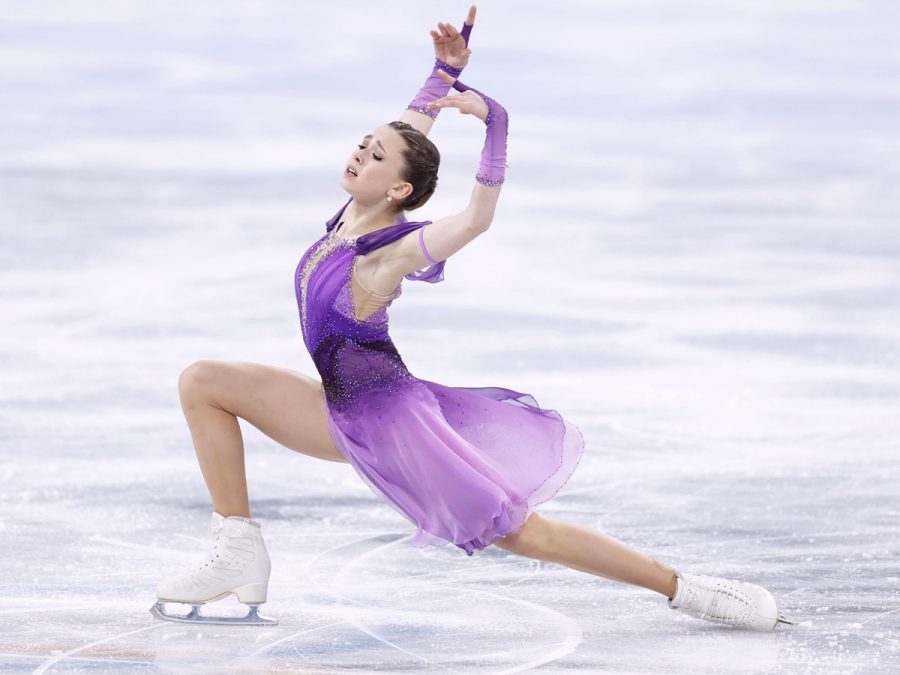Kamila Valieva tests positive for doping
Kamila Valieva of the Russian Olympic Committee performs in the women’s short program of the figure skating team event at the Beijing Winter Olympics on Feb. 6, 2022, at the Capital Indoor Stadium. (Photo by Kyodo News via Getty Images)
March 31, 2022
Amidst the intense competition of the 2022 Beijing Winter Olympics, a scandal has emerged with 15-year-old Russian skater Kamila Valieva, who tested positive for three heart-related drugs, one of which is a known performance-enhancing drug that has been banned by World Anti-Doping Agency.
While this shocking revelation was the first occurrence of drug use in the 2022 Winter Olympics, Russian doping has long been an established pattern. In the 2014 Sochi Olympics, Russia (the host nation) was caught participating in a state-run doping system that allowed for the Russians to double their medal production. Following the discovery of the 2014 Russian Olympics scandal, Russia was banned from competing until 2019, which was supposed to last for the next four years and covered both the Summer and Winter Olympics, but instead will last until December of 2022. In lieu of the ban, Russian athletes are permitted to compete for the Russian Olympic Committee or the ROC instead of their home country, Russia. This still prevents any medals won by Russian athletes to count for Russia, but it does allow for them to compete in the Olympics, which somewhat defeats the purpose of the ban.
Valieva, who is competing for the ROC, recently set a world record during her first Olympic appearance in her short program for the team event, where she was the first female skater to ever land a quadruple jump at the Olympic games, as well as being the first woman to ever score higher than a 90 on her short program. She led the Russian skating team to first place in the team event, where she nearly topped her previous world record. Valieva was taking the competition by storm and was favored to win gold in all of her other competitions, until news of her doping allegations quickly spread. Though the positive test came in December of 2021, the results were not released until after Valieva had already competed in her first Olympic event. The reason behind the delay has not yet been decisively given.
Perhaps the more surprising fact is that she was cleared to compete in the other women’s skating events she was set to compete in, despite her positive test. She tested positive for trimetazidine, which is known to improve endurance, blood flow and oxygen intake, as well as two other heart-related drugs that are not banned, hypoxen and L-Carnitine. Initially following the positive test, Valieva was put on provisional suspension by the Russian Anti-Doping Agency (RUSADA), although that was quickly dropped following her hearing, much to the surprise and anger of other anti-doping agencies (like the aforementioned World Anti-Doping Agency).
As to why Valieva has been allowed to compete, RUSADA cites a few main points: for one, she is a minor under the age of 16, meaning that technically, she does not have control over her own intake of medications. Though this is certainly a loophole around the accountability of consuming a performance-enhancing substance, the ruling does technically abide by the rule. This does, however, raise the question as to who was giving her the drug, because if the blame is not on her, it must be on someone else. Another factor that lifted her suspension was the timeline, and the suspicious delay in her test results, as well as the fact that she tested negative for her doping tests prior to the Olympics (those tests are not regulated by Russian authorities, or any other biased parties).
While Valieva may be allowed to compete in her upcoming events, her investigation is still pending, and depending on her results, any medals she will win can potentially be stripped from her, including her gold medal she won with the Russian team in the team event. Questions have arised over who is responsible for her drug use, and a lot of people in the skating community have raised valid questions as to why she is allowed to compete.
Sha’Carri Richardson, an American sprinter who qualified for the 2020 Summer Olympics but was disqualified after testing positive for marijuana, voiced her opposition to the decision to let Valieva compete. “Can we get a solid answer on the difference of her situation and mines? My mother died and I can’t run and was also favored to place in the top three. The only difference I see is I’m a black young lady,” Richardson stated on Twitter. Many were drawing on the double standard presented, both between different countries’ policies (like Russia lifting Valieva’s ban versus the U.S. disqualifying Richardson immediately) and racial divides.Richardson only used marijuana, which is not proven to have any positive effect on athletic performance but is still banned by WADA, whereas Valieva consumed a drug that is both banned and that has known benefits to athletes.
Amongst the concern about allowing Valieva to compete, many are also worried about why she tested positive and whether or not she had a choice in it (assuming that she did actually consume the performance-enhancing drugs). In her hearing, Valieva claimed that she tested positive due to exposure to her grandfather’s medications, whereas her mother claimed that she was actually taking the drug for heart abnormalities. The results on her heart tests are still pending, but she should test negative for any heart conditions, the gravity of her situation would likely elevate.
Regardless of your opinion on if she did take the drugs or if it was her choice, the reality is that Russia has been consistently cheating in the most recent Olympic Games, and despite them being banned from competing under their own flag, continue to repeat this atrocious behavior. There is a double standard in countries like Russia, and they need to be held accountable for continuing to cheat year after year. Valieva may not have had a choice when it comes to the performance-enhancing medications, but somebody did and she cannot be allowed to compete against athletes who competed cleanly and fairly. Every record Valieva sets and medal Valieva collects will forever be tainted by scandal of her doping in the 2022 Olympics, despite her “prodigy skill” and undeniable talent.



